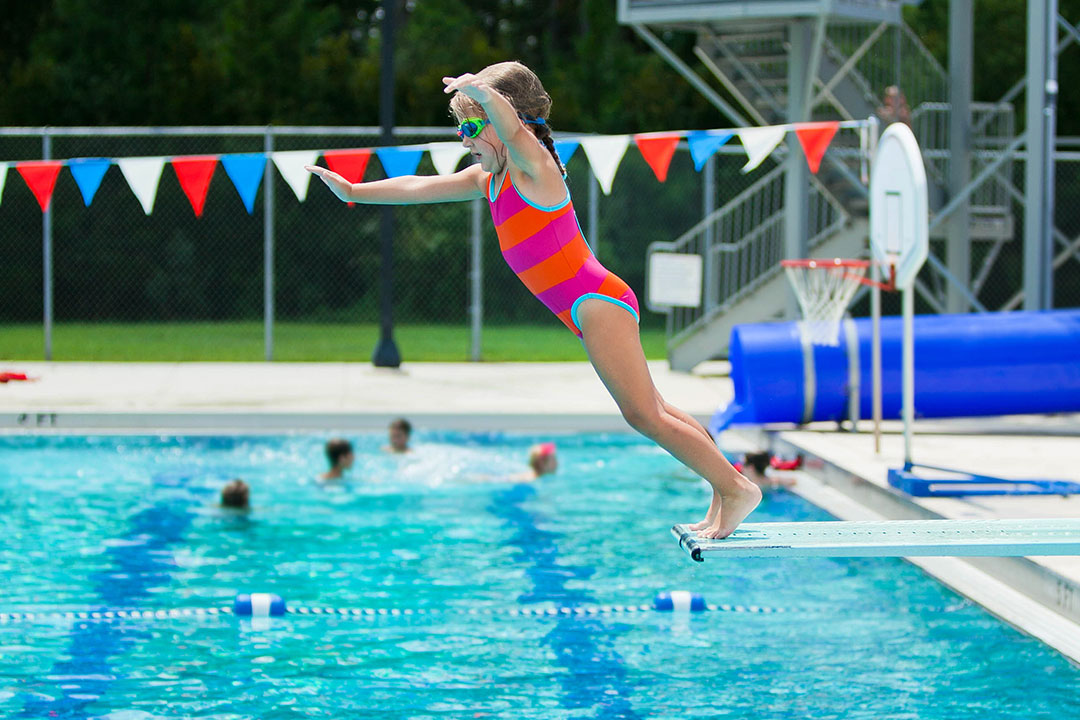There is nothing like a quick dive into a pool to cool you down from the summer heat in Missouri and Illinois. However, it may quickly turn into a disaster if there are injuries from falling into water or diving. Whether you swim for exercise, dive for excitement or just visit a pool to float, safety is of utmost importance to avoid swimming injuries and serious diving board accidents.
According to the CDC, there are an estimated 22 nonfatal drownings a day. Drownings from swimming injuries or a dive injury can result in long-term health problems such as a traumatic brain injury or physical disabilities from paralysis. While a higher amount of swimming and diving board accidents happen during the summer months, you should take note of these 8 tips to stay safe in and out of the water in Missouri pools, rivers and lakes all year long.
1. Make sure you or your child knows how to swim.
If you or a loved one does not know how to swim or is unable to swim, make sure they are not in a situation where they could obtain injuries from falling into water. Come prepared with life vests and floatation devices and keep an eye on those who are unable to swim while they are in the water.
2. Don’t run or dive into waves headfirst.
The best way to enter an open body of water in a river or a lake is feet first. Oftentimes, the water is too shallow for diving. Going feet first prevents the possibility of sustaining a traumatic brain injury or concussion from a wave, hitting your head too hard from the wrong angle, or from underestimating the speed of the wave.
3. Don’t swim in pools, rivers or lakes during or immediately after a storm.
Check weather conditions before you embark on a day at the pool or on the water. During a lightning storm, water conducts electricity and may pose a risk to those who are out on or in water. Additionally, rivers and lakes may rapidly change water levels leading to flash flooding and strong currents following a rainstorm.
4. Don’t dive into shallow waters.
Many public pools have markings denoting the depths of water; however, you must still exercise caution to avoid diving board accidents and other diving injuries in shallow pools. Refrain from diving and walk down pool ladders or enter the pool feet first if the water is too shallow for diving. For lakes and rivers, enter the water slowly from the beach, dock or boat rather than diving into an unknown depth.
5. Only dive off the end of a diving board.
The end of a diving board faces towards the middle of the pool where a diver is in the best position to dive. Diving board accidents are more likely to occur if you dive off at opposite angles of a board instead of down the middleInjuries commonly result from a person diving into another person who is getting out of the water, hitting the side of the pool or diving into pool equipment such as ladders. Follow the pool’s diving instructions in order to avoid diving or swimming injuries to yourself and those around you.
6. Avoid diving or jumping into murky waters.
While many of our rivers and lakes seem clear to the eye, it is best to not underestimate and dive headfirst into the water not knowing what lies beneath. In recent months, Missouri officials at the Lake of the Ozarks have stressed the dangers of cliff jumping in our state’s bodies of water, which creates a harder impact than jumping into a pool.
Be cautious before jumping or diving into waters that are too shallow for diving and make sure people are nearby to assist you if a dive injury occurs. Oftentimes, Missouri rivers and lakes are plagued by deceptively strong currents that can harm even the strongest of swimmers.
7. Alcohol and water don’t mix.
Alcohol affects not only your fine motor skills but also your sense of judgment and impairs your vision. When drinking alcohol near a pool or body of water, maintain a safe distance to prevent a serious injury from falling, slipping or drowning.
8. Be prepared for emergencies.
Many swimming injuries may be resolved with simple first aid practices. However, CPR training and having an active plan for reaching medical personnel may save someone’s life if they sustain diving injuries.
For additional safety, it is also a good idea to wear a brightly colored swimsuit so it is easier for others to see you in the water if you encounter a dangerous situation. Murky waters can prevent others from seeing you if you are wearing a dark swimsuit while swimming or diving.
Here For When Swimming and Diving Accidents Happen
At MHM, we know that catastrophic injuries like diving and swimming injuries may leave a lasting physical impression, but they also may go beyond the surface. Our catastrophic and brain injury attorneys will help you pursue the best outcome for you so you and your family may recover from the damages you experienced following a diving board accident, swimming injuries or catastrophic dive injury.
For more information about our practice areas and the types of cases we handle, contact our team today to get started.
